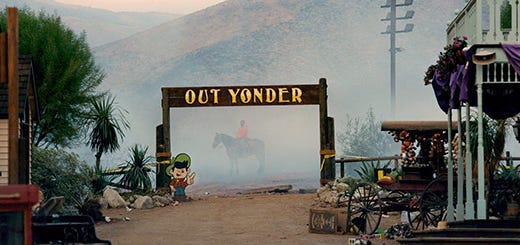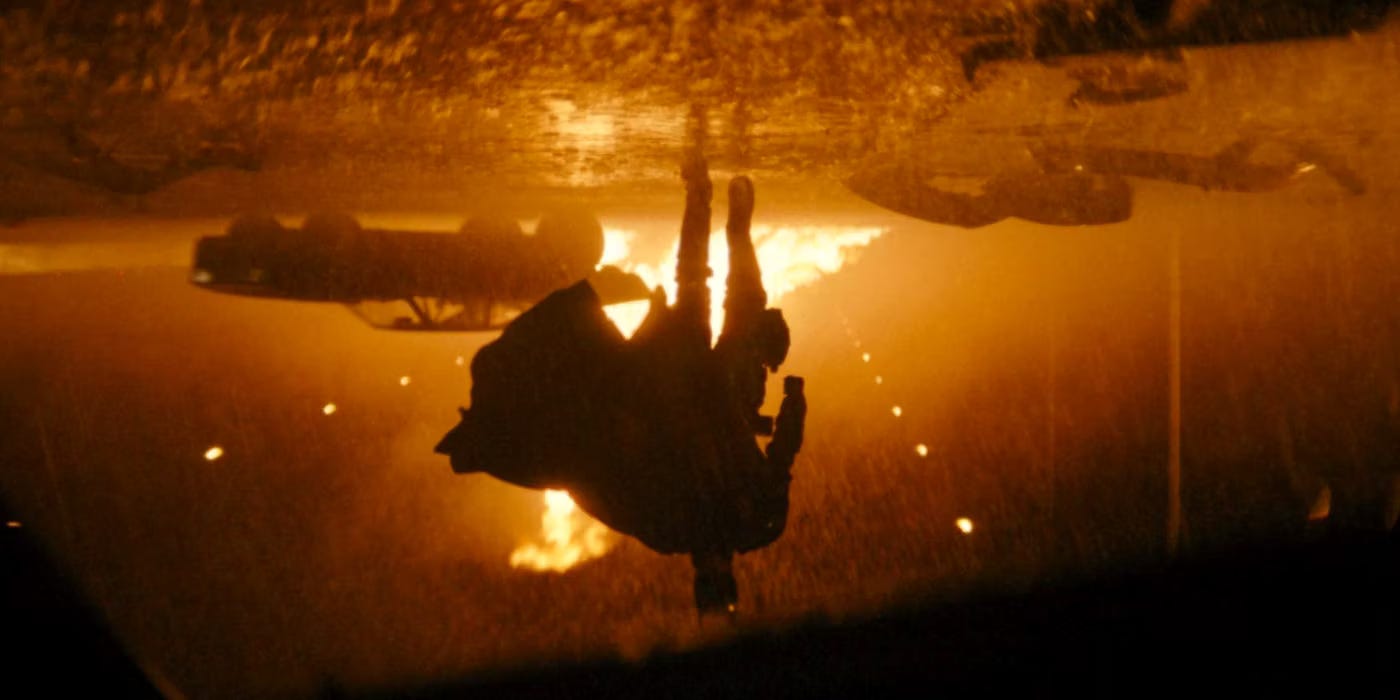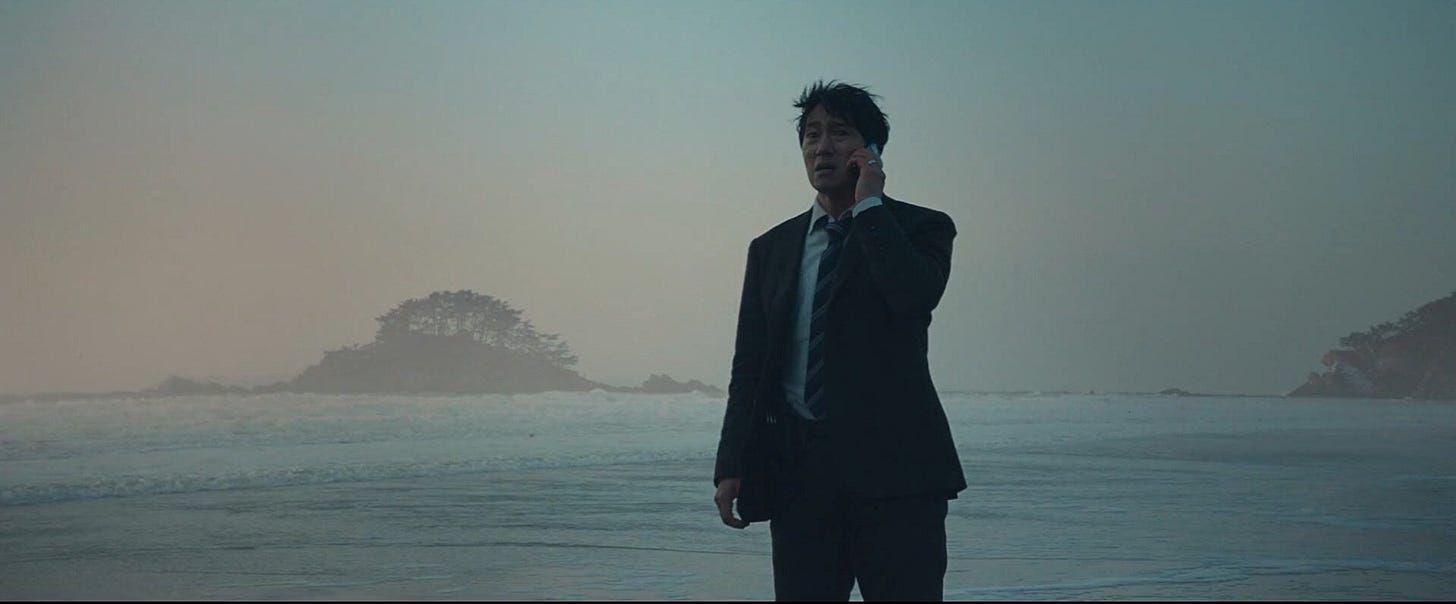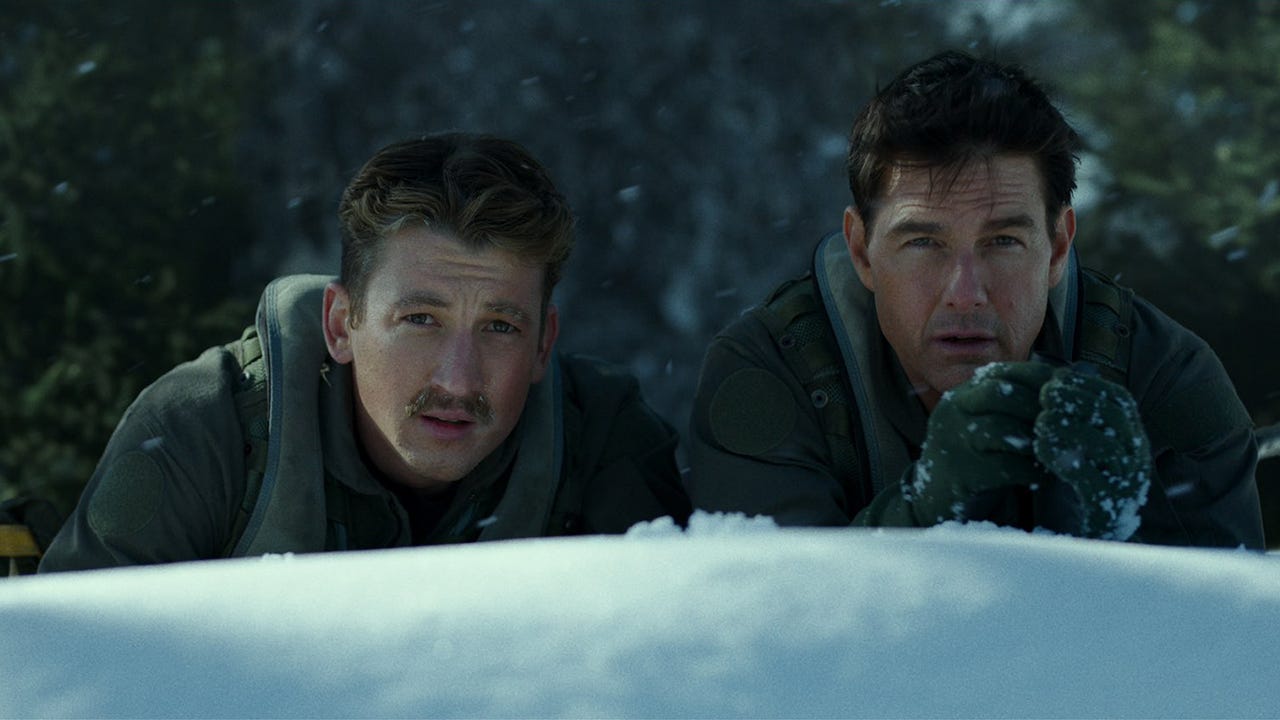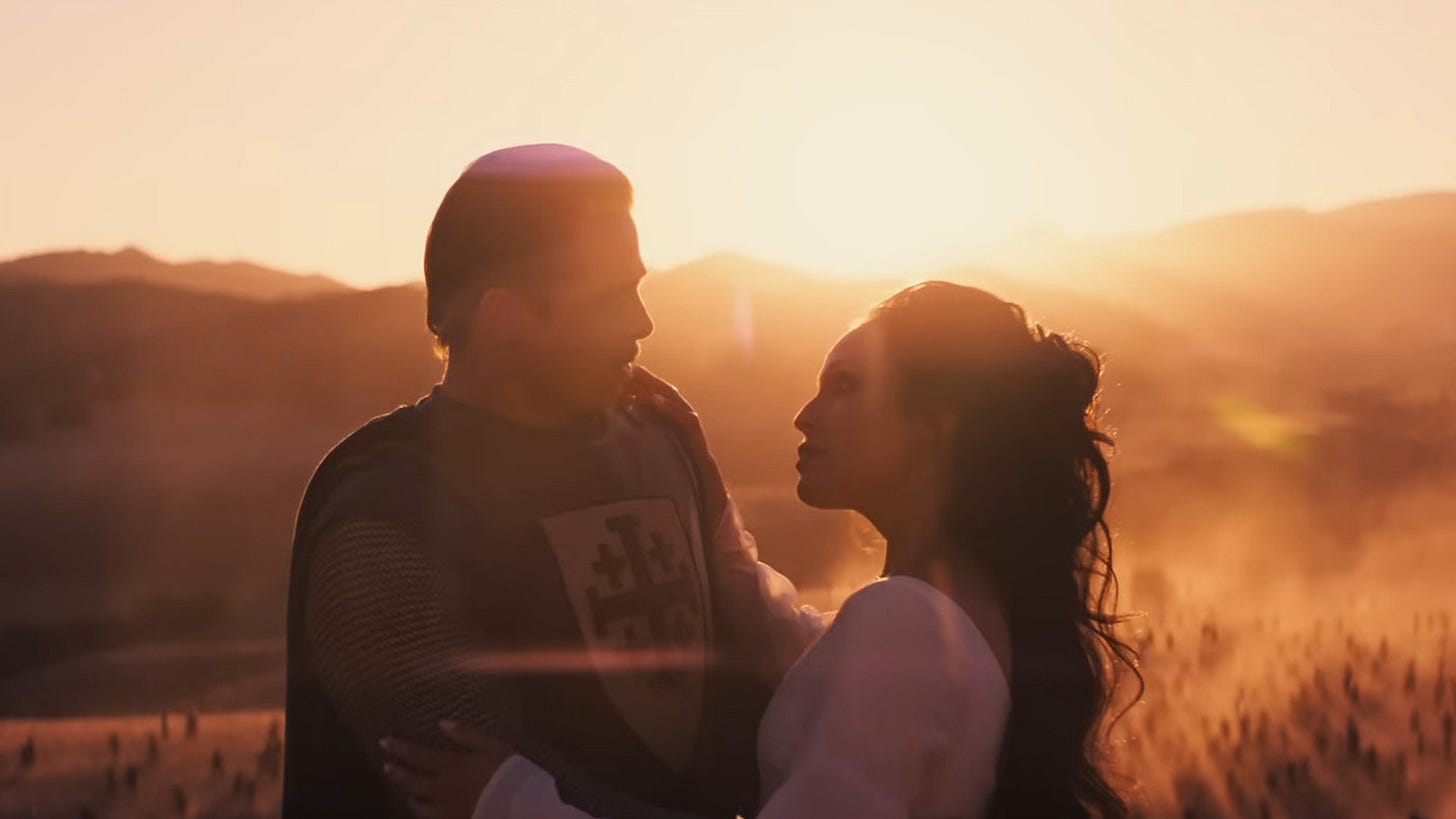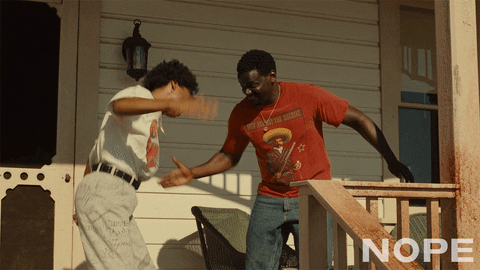There’s been some talk about this being a weird and/or down year for movies, but from where I’m standing, we got at least one good-to-great film in almost every genre and budget level. It’s a bit of an anomaly that 3 or 4 of my Top 10 films could be considered “blockbusters” of one kind or another, but rather than calling me basic, why don’t we take this as a sign of the upward trend in recent blockbuster filmmaking? And lest you judge me too harshly, almost everything else on my list has some indie or arthouse cred, or else has something else unique about it to set it apart from the Top Gun’s of the world (not - as you’ll see - that there’s anything wrong with Top Gun).
There’s something for everyone, I’m saying, and there was certainly a lot for me. It’s rare I give out more than one 5-star rating in a given year, rarer still that I have a Top 13 of all 4.5 stars and above. I’ll take it. Despite being so different, my favorite movies of the year are all so similarly great that it was harder to rank them than ever. You could put #4-13 on my list in basically any order and I’d be okay with it, so don’t put too much stock in this one; if it’s on here at all, I loved it. Movie theaters are in as precarious position as they’ve ever been, but this year’s films are argument enough for their continued necessity.
(You can find the full ranked list of every new release I saw this year here.)
10. The Northman - dir. Robert Eggers
The details of The Northman’s lore and history might be painstakingly researched down to every last blood-soaked grain of its night vision film stock, but to a certain extent, it’s all table dressing - not there to be the meal, but to make the meal taste better. This isn’t a historical tour, but an all-immersive safari; you can gather all the anthropological lessons you’re meant to from the smell of the beasts’ breath and the glint of their fangs. And The Northman has a lot of fangs.
Worth noting: no chapter title in all of cinema or literature has ever gone harder than “The Night Blade Feeds.”
9. The Batman - dir. Matt Reeves
It only took them 50 years to figure out how to make the prestige blockbuster version of Batman solving riddles, and they were rightly rewarded with 700 million dollars and unending praise for their efforts. This movie understands that Batman should be a little bit corny; his name is Batman and he fights the Riddler, after all. No goon in Gotham ever takes the idea of a grown man in a bat costume seriously - until it steps out of the shadows and pile-drives them into the pavement. This Batman is a little bit scary, too.
He’s certainly not the star of a superhero movie. Sure, there’s a big third act and some wham/pow/kabooms, but there’s no glowing orb, no mystical powers - unless you count the powers of reasoning and deduction. Reeves likes his heroes on the ground, working out their vengeance with fear and trembling. And thanks to some niftily placed POV cameras (and vertebra-loosening IMAX speakers), we’re right there for the ride, feeling every symphonic tremble in our chests. I’m not sure they knew exactly where to end this latest volume of the Bat’s story, but you can’t blame them - I didn’t want to leave this soggy, infested, fluorescent Gotham either.
8. Tár - dir. Todd Field
Tár is probably the best 3-hour movie you could possibly make about an acclaimed composer/conductor’s downfall, which - despite sounding like a backhanded compliment - is no low bar to clear (Amadeus exists, after all).
For as much as Tár invokes liberal bubbles, cancel culture, and the shadowy territory of power imbalances outright, it’s all the more impressive for how it evokes those ideas (and more!) through suggestion and elision. In an old Leonard Bernstein tape Lydia Tár watches at one of her various low points, the maestro espouses the translative power of music to express those feelings that exist between words. Tár is something like that - or to be even more obvious, it’s something like a symphony. You could catch any one of its many melodies and follow it in a million different interesting directions, but you sense that they’re all circling something greater - a jet-black negative space where the elusive truth lives. Just when you’re closing in on the eye of the moral hurricane, you’re whisked back into the storm by another countermelody.
Setting this story about the nuances of hierarchy in the nuanced hierarchy of an orchestra is another stroke of genius (one that was equally thrilling and triggering as a former full orchestra kid). You’re going to elevate Tár into a position dependent on her absolute authority, and then balk when she uses it absolutely? That’s what she just can’t understand, and watching her struggle to grasp it across two-and-a-half dense, novelistic hours is a lot more fun than it sounds. Of course, a novel couldn’t sound (or look) like this, nor have a Cate Blanchett as masterfully dialed-in as she is here. She’s a self-contained inferno, and it’s a beguiling blast to watch her implode.
7. Cha Cha Real Smooth - dir. Cooper Raiff
I think the reason so many people have a problem with Cooper Raiff is the same reason I’ve enjoyed both of his films so much:
There’s a contradiction inherent in portraying yourself both as an aimless recent grad with a lot of growing to do and as a winsome charisma machine with a heart of gold even Dakota Johnson can’t resist. It’s hard to simultaneously sell a coming-of-age tale and a wish-fulfillment fantasy, especially when the point you’re trying to make (22-year-olds really don’t know anything yet) is metatextually undercut by the fact that you wrote and directed an acclaimed film about how 18-year-olds really don’t know anything yet when you were a 22-year-old, and now here you are at 25, winning Dakota Johnson and her production company over with your heart of gold and getting to make your second movie about how you’re still figuring it out. By telling us he doesn’t know any better while showing us he does, Raiff gets to be both the guy he’s lovingly critiquing and the guy earning points for critiquing the other guy, having his cake and filming it too.
I just really, really, really love that cake. It’s messy, but the wish-fulfillment works on every level for me: I want to be the sadboi whose kindness can’t help but shine through his immaturity, and I want to be the cool indie artist wisely telling the story of the charming sadboi. Whatever that says about me is probably worthy of the same criticism directed at Cooper, but I’ll just put on some Red Machine and cry about it. Or not, because the same emotional directness and vulnerability Raiff shows here (performative or not) is the same emotional directness and vulnerability I’m working hard to develop in myself, and so maybe there’s another layer of wish fulfillment here in that I want to be as open as Cooper appears to be.
That’s all for argument’s sake, but it doesn’t really matter to me; when it comes to art like this, the questions of how it moved me or whether it should’ve are secondary to the fact that it did. If you’re open to it, I think it’ll move you too.
6. Everything Everywhere All at Once - dir. Daniels
It should really be no surprise that EEAAO inspires so many wildly different reactions; that’s practically its thesis, that everyone everywhere is always dealing with inifinte choices (seen, unseen, made, unmade), those choices bouncing off of everything the person has lived through and all of the wondrous and horrible things they’ve seen. The movie takes that messy glob of personal everythings and kaleidoscopically stretches it out to space before using the empathy and perspective gained from the expansive journey to telescope back to Earth, zooming in on the people in our lives we sometimes let be swallowed up by the maw of everything they’re not - who they could be, who we could be, where else we could be, etc., etc.
With opportunity costs and “could’ve” hypotheticals sitting as the dual devils on our shoulders, the easiest response to all that everything can be to sidestep it, deciding none of it matters. Fortunately, it’s not a huge jump from “nothing matters” to “nothing matters but this,” choosing to tune out the noise for the grounding signal of our loved ones. And in a universe of infinite universes, how romantic a notion it is to stop and invest in the one we have, giving each other the same grace to be messy that we forget to ask for ourselves. In finding the beauty in each of our messes, Everything Everywhere All At Once makes some messy beauty of its own; in taking a little bit from everything, it ends up looking like absolutely nothing else.
5. Decision to Leave - dir. Park Chan-wook
An unexpected but superlative entry into the “U up?” cinematic canon
Either despite or because of its unusual structure, this mystery is somehow both deceptively simple and deceptively complex - so maybe, just deceptive? In any case, it’s the kind of movie you’re grateful to be fooled by, elucidating its investigative mysteries with one hand while muddying its emotional waters with the other - with an unlikely vein of pitch-perfect comedy connecting the two. “What if Phantom Thread were a slapstick buddy-cop procedural?” asked no one, but we’re all lucky Park Chan-wook answered. Decision to Leave… me alone to chew on this one for a while!
4. Top Gun: Maverick - dir. Joseph Kosinski
What else do you want movies to do? Where else could our modern gladiator possibly go, short of orbit? (And if MI:7 rumors are to be believed, which of course they are, Tom’s already been there.) Sure, we might’ve left the realm of subtlety nine G’s back, but as these characters remind each other again and again, there’s no time to think up here - just time to remember you have a heart to be squeezed, and a pulse to be skyrocketed, and eyeballs to be blasted into your headrest. If they didn’t want to make one of the best movies of the year, they shouldn’t have let Tom and these lovable kids anywhere near a cockpit - and they darn well shouldn’t have given Hans this many horns.
3. Glass Onion - dir. Rian Johnson
I’m such a mark for these de/reconstructed whodunits that Netflix should put me on retainer for year-round publicity, which means I was incredibly disappointed when this was finally released on Netflix and so many friends and family members seemed to be underwhelmed by it:( As an avowed Agatha Christie-head, there’s no one I trust more than Rian Johnson to shoulder (and gently evolve) her giant legacy of inventive plotting and clever twists. And where he easily could’ve run back Knives Out’s greatest hits, he instead took yet another page out of the Mother of Mystery’s book and set this second Benoit Blanc adventure on its own, exploring new shapes and formal challenges to keep himself (and us) entertained.
I’ll have more writing about this movie to share soon, but for now, I’ll say this: Throwaway jokes line up like crossword clues across the film; twists conceal other twists like one of Miles’ puzzle boxes; even unassuming production designs and seemingly simple reveals have arcs that can be traced all the way back, weaving around and layering upon one another until the structure of it all is mind-numbingly polyhedral. But just like the titular polyhedron, there’s a clear sightline to its core, a firm center holding all the narrative wizardry in place. Johnson can write a thrilling whodunit, and write it backward, but with Glass Onion he’s done both at once, tricking us only to join us in laughing when we realize how - and how cleverly - we’ve been tricked. A million more of these.
2. Babylon - dir. Damien Chazelle
Movies will live forever, maybe, but if the pile of them keeps growing larger, who’s going to remember every poor sap whose blood, sweat, and excrement held the pile together in the first place? There will always be some new layer - be it talkies or technicolor or Avatar - to paint a thin coat of gloss on a tall stack of crap. Diego Calva’s Manny and Margot Robbie’s Nelly spend Babylon’s marathon runtime climbing that stack, only to reach the summit and realize what they’re standing on. That view from the top is money, though, so awe-inspiring you can barely smell the dung on your shoes. Movies are magic built on backs and blood and bile, but we need them but they kill us but they’re worthless but they’re everything.
Babylon is far from perfect - some of the excessively explicit stuff feels like a kid playing with newfound profanities, the various threads are disjointed at times, and the third act doesn’t have the intoxicating energy of the first two - but they really don’t make them like this anymore. If Chazelle is to be believed, maybe they shouldn’t, and maybe they won’t. But if this is the Last Movie it almost wants to be, it’s going down swinging, wrapping itself in century-old tinsel and kamikaze diving right into the disgusting heart of Hollywood. Seven or eight different scenes from this would be clear stand-outs in basically any other film; in Babylon, they’re just one more to throw on the burning pile. And what a sight to watch it burn!
(*Note: I originally had this at #5, but a second watch slotted most of the parts that didn’t work for me the first time into place and buttressed the parts I already loved, bumping the whole ambitious thing up, up, up.)
1. Nope - dir. Jordan Peele
In a year of impossible Top 10 decisions, no spot was easier to decide than the top one. Jordan Peele’s third “social thriller” blew into theaters on a mysterious wind and promptly snatched the brain right out of my head. Even this close to my first encounter with its oblique majesty, I have no qualms at all about full-throatedly declaring it a masterpiece - a sprawlingly intimate, hilariously disturbing spectacle about the rubbernecking danger of spectacle.
We will - and have, and will - commodify trauma until we can’t, because we’re arrogant enough to think we can tame it. We can’t - and can’t, and can’t - and we’ll become more and more warped by the horrors we’re forcing on ourselves until we realize the only way to neutralize the spectacles we’ve created of them is to stop looking, if only we can wrench our eyes away from their tractor beam pull. Peele makes that point - as usual - with lightly abstracted aplomb, and he makes making it just about the most fun a kid can have.
Daniel Kaluuya best actor alive, Keke Palmer supernova, Steven Yeun unimpeachable, Brandon Perea note-perfect, Michael Wincott comedy icon, Jordan Peele visionary (for real, not just in the “From the visionary director of Transformers: The Last Knight…” way). A perfect film.
Honorable Mentions
The Banshees of Inisherin - dir. Martin McDonagh
Perfect storytelling? Works as allegory or not, folk tale or not, tragedy or not. You’d expect a story this elevator-pitch-y to either be goofy in execution or to crumble under the weight of its staginess, so when its architecture proves sturdy enough to support not only our credibility but also our genuine shock, interest, care, heartbreak - Martin might have a winner. We can only hope that winner is Colin Farrell on Oscar night.
Women Talking - dir. Sarah Polley
There are a million ways to make a bad movie about a topic as serious as this, but Sarah Polley found a million great ways to make one, imbuing the could-be didacticism of the story with empathy, intelligence, and wit. Most impressive of all, it’s not a low-hanging rebuttal of the faith that’s been distorted here but a rebuking of the distortion of that faith. Indeed, these women demonstrate the steely assurance necessary to wrest your faith away from the people who would exploit it for power, and they’re rewarded with a still-intact, more righteous faith on the other side to give them the courage to keep walking. What could be more hopeful than that?
(Note: This could’ve very easily made my Top 10, along with Banshees. Walking out of the theater, I was even flirting with putting this as high as 5 or 6, but out of an Abundance of Caution against recency bias, I’m ceding its spot to movies I’ve loved for longer. Don’t sleep, though.)
RRR - dir. S. S. Rajamouli
Easily one of the most satisfying (narratively, emotionally, historically) and entertaining (dazzlingly, dazzlingly, dazzlingly) movies I’ve ever seen, and if it drags a tiny bit around the midpoint, don’t worry: there are still at least four complete battle sequences, a prison break, and a couple of beautiful musical numbers waiting in the back half. We’re asking far too little of our American stars; every blockbuster action film should require them to fight, dance, and sing like Ram Charman and N.T. Rama Rao Jr. gloriously do here.
Aftersun - dir. Charlotte Wells
One of those movies comprised almost entirely of scenes that seem to have no greater significance, leading you to the conclusion that they all have greater significance. Maybe that’s why I found this so moving even though very little happened in it to overtly move me. Without a Climactic Moment to outlast the rest in my memory, the rest works as collage, authentically synthesizing the way we remember and the graininess of how we hold our people in our heads. When they’re gone, that version of them - scattered, banal, incomplete - is preferable to nothing. That’s when home videos really balloon in value, graduating from an imitation of a real person to something like a reanimation.
Not that the movie ever explicitly invokes any of these ideas - it’s far too unimposing for that, content to let them float in the ether like paragliders reflected in a hotel pool. But by never forcing me to think about them, and by never telling me to feel anything, Aftersun all but guaranteed I would.
Avatar: The Way of Water - dir. James Cameron
Essentially the same story as the first, just better paced, better looking (when it’s not running at an unnecessarily high frame rate that makes it look video game-y), and chock-full of jaw-dropping scenes, especially in the last hour. It seems destined to follow in its predecessor’s footsteps of making all the money in the world and then disappearing into cultural irrelevance, but then again, its early success indicates that something about Pandora stuck with us from the first round, so maybe this time it will make a more lasting impact. And besides, Big Jim’s getting back in his sub either way, so who cares? This ride was worth remembering it all for, and I’m sure the next one will be too.
The Menu - dir. Mark Mylod
Delicious! Like Bodies Bodies Bodies, you love to see a thriller ingeniously employ its central “game” as a trap, forcing its victims to keep playing by the same rules even when the stakes have blown way past reasonable. We’re in the same boat (or on the same boatless island), as excited to see the next dish and its theatrical accouterments as we are the next deadly twist.
Between this and Succession, Mylod said I simply WON’T work unless I’m given a dummy-hard score. And composer Colin Stetson said YES CHEF!
Bodies Bodies Bodies - dir. Halina Reijn
AKA “Murder on Euphoria Express,” this isn’t as gimmicky as the trailer makes it seem. If its ideas about how the most Gen Z among us look and talk come across as a little surface-level, it’s only because the movie has smarter ideas about what’s hiding underneath that surface. It all adds up to a genuinely fresh take on the locked-room whodunit, and if the denouement is more investigative of emotions than crimes, I think even Agatha could forgive it; the clues were still pointing us there all the same.
Prey - dir. Dan Trachtenberg
I’m as surprised as you are to be giving this spot to a sequel to Predator, a movie I had never seen until this year and didn’t enjoy very much when I did. But this is different; just as 10 Cloverfield Lane inventively turned an alien movie inside out and stuffed a kidnapping thriller inside, Trachtenberg has ground the sprawling Predator series down to its essentials, blending it with a little bit of The Revenant and Planet Earth for good measure. And where the original started as one kind of action film and sharply pivoted into another, Prey weaves together its various threads - of Comanche rites and natural pecking orders and invasive trappers - in a more seamlessly braided rope. And there’s an axe on the end of it, dripping neon green blood. It couldn’t be cooler.
Barbarian - dir. Zach Cregger
A super solid little freak flick. It uses its Candyman-esque sociohistoric setting as an interesting thematic springboard (even if I was too stupid to fully grasp where it was springing to), and its structural loops work really well (seeing the same horror scenario through two different characters’ eyes is both hilarious and a nice callback to an earlier line about how women vs. men approach problems). It also looks great, has performances that are all dialed into the exact right frequency, and - unlike Malignant - knows when to raise the crazy and when to just maintain the pitch, keeping everything cohesive and saving us from a ten-thousand-shark jump.
Jackass Forever - dir. Jeff Tremaine
I’d never seen a single Jackass movie until this year, when I saw them all. This is the best one not because it has the best stunts (it doesn’t) or because it’s the only one I saw in theaters, but because it’s the first one to limit the carnage to strictly this crew and its willing co-conspirators, rightly focusing on the love and history that ties these old sickos together even tighter than the all the shared bodily trauma. Johnny Knoxville might be a sadistic genius, but if it’s possible to be both, he’s also a benevolent one.
Movies Just Missing the Cut: Triangle of Sadness, Men, Jeen-yuhs (yikes), The Fabelmans, Elvis, Three Thousand Years of Longing, Athena, Apollo 10½, Dual


